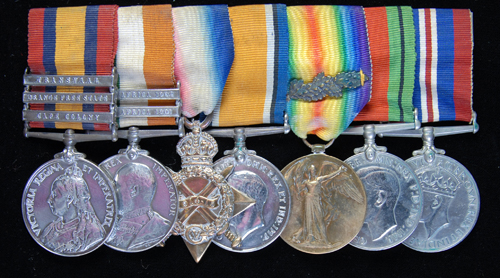
Auction: 12002 - Orders, Decorations, Campaign Medals & Militaria
Lot: 477
Seven: Warrant Officer Class I F.G. Payne, Queen´s Own Royal West Kent Regiment, Late Royal Army Service Corps and Royal Army Medical Corps Queen´s South Africa 1899-1902, three clasps, Cape Colony, Orange Free State, Transvaal (14147 Pte. F.G. Payne. R.A.M.C.); King´s South Africa 1901-02, two clasps (14147 Pte. F.G. Payne. R.A.M.C.); 1914-15 Star (T4-039964, Dvr. F.G. Payne, A.S.C.); British War Medal (T4-039964 A.W.O. Cl.1 E.G. [sic] Payne. A.S.C.); Victory Medal, M.I.D. Oak Leaves (T4-039964 A.W.O. Cl.1 F.G. Payne. A.S.C.); Defence and War Medals, cleaned, nearly very fine or better, mounted as originally worn, and contained in a leather case, embossed ´F.G.P. 1900-1945´, with the following related documentation &c.: - Warrant appointing Frederick George Payne a Warrant Officer Class II in the Royal Army Service Corps, dated 28.8.1920 - Mentioned in Despatches Certificate, dated 25.3.1918 - Photograph of the recipient leading a R.A.M.C. waggon train in South Africa - Two newspaper cuttings regarding the recipient´s death - WOOD, Frederick J., The History of the Maidstone Companies, Royal Army Medical Corps (Volunteers), Maidstone 1907, Crown Octavo, 89 pages, with illustrations - WILSON, H.W., With the Flag to Pretoria, A History of the Boer War 1899-1900, 2 Volumes, London 1900, Medium Quarto, 716 pages, with illustrations, bound in red cloth, binding and spine damaged - WILSON, H.W., After Pretoria: The Guerilla War, 2 Volumes, London 1902, Medium Quarto, 1008 pages, with illustrations, bound in red cloth, considerable damage to binding and spine - The recipient´s South Africa 1900 Soldier´s New Testament (7) Estimate £ 200-250 M.I.D. London Gazette 11.6.1918 T4/039964 Payne, Sjt. F.G., A.S.C. 039964 Warrant Officer Class I Frederick George ´Punch´ Payne was born in Maidstone, Kent, in 1882 and educated at Holy Trinity School, Maidstone. Upon leaving school he worked as a builder, before volunteering for service in South Africa with the Royal Army Medical Corps. Enlisted into the Fourth Contingent, Maidstone Companies, R.A.M.C., Payne left Kent for South Africa on the 16th May 1900. In South Africa he served first on No.5 Hospital Train, employed as an assistant cook, and reached Mafeking on the 31st August 1900, one day after the great cyclone. While at Bloemfontein a few weeks later he contracted ptomaine poisoning, and was in hospital for fourteen days. Upon leaving Bloemfontein he was sent to the Artillery Barracks at Pretoria, for duty with the 2nd Cavalry Brigade under General French. He joined the Brigade at Kalfontein, and soon afterwards started on their great drive in the South-Eastern Transvaal, during which he saw much fighting, especially at Bethel. Posted to Brigade Headquarters, in charge of Medical Stores, he occasionally accompanied one of the mobile columns as a mounted orderly, and was thus employed for a further three months, after which he was sent to Naauwpoort for duty. He stayed there for a further two months, before returning to England in March 1902, having spent 1 year and 301 days in South Africa (The History of the Maidstone Companies, R.A.M.C. refers). On the 28th May 1902 H.R.H. Princess Henry of Battenberg presented Queen´s South Africa Medals to thirty-two members of the Maidstone Companies at a parade in Vinters Park, Maidstone. The following month Payne was part of a detachment of the Maidstone Companies selected for duty in London on the occasion of the Coronation of H.M. King Edward VII. However, whilst encamped in Kensington Gardens, the detachment learnt of the King´s serious illness and the indefinite postponement of the Coronation, and were stood down. At the postponed Coronation in August the Companies were again represented, but only by a smaller detachment, and Payne was not selected this time, missing out on the Coronation Medal (ibid). At the outbreak of the Great War Payne enlisted in the Army Service Corps on the 7th August 1914, and served with the Corps on the Western Front throughout the Great War; was advanced to Company Sergeant Major; and was Mentioned in Despatches. Following the War he was instrumental in forming the Maidstone Branch of the British Legion, serving as the Branch´s Parade Marshal. At the start of the Second World War he enlisted on the 26th October 1939 in the Queen´s Own Royal West Kent Regiment, and served with them for 2 years and 27 days before being transferred to the Reserve for the remainder of the War. He died at home in Maidstone in 1955.
Sold for
£300




